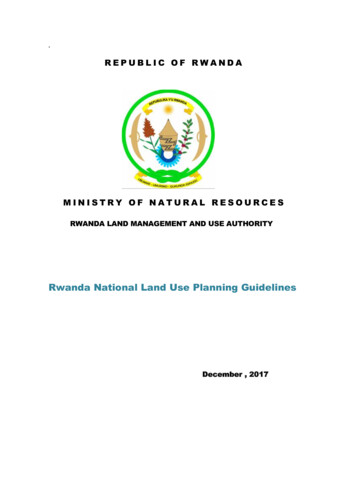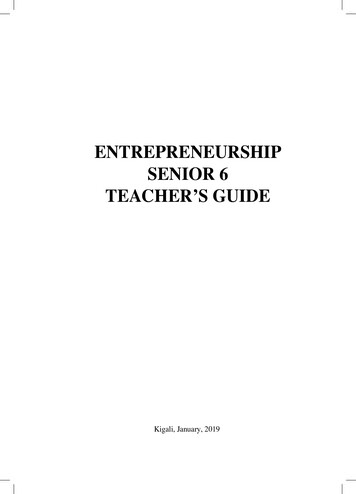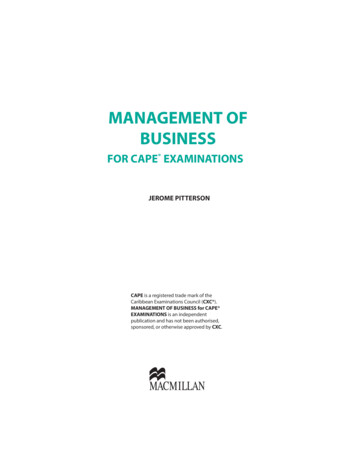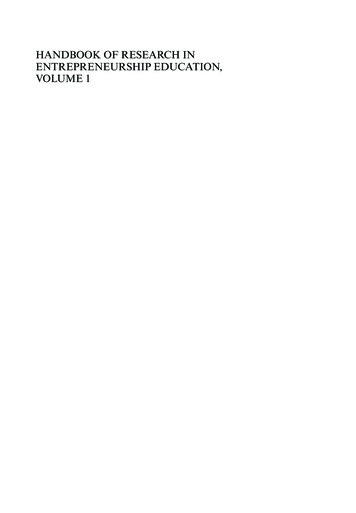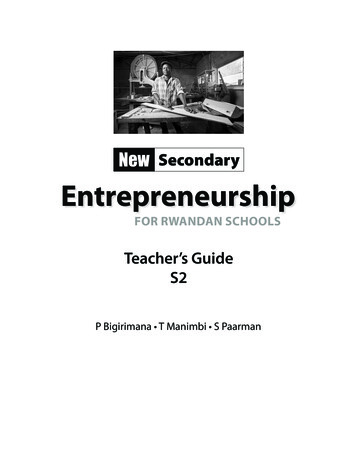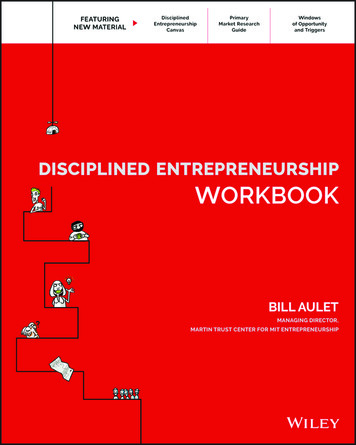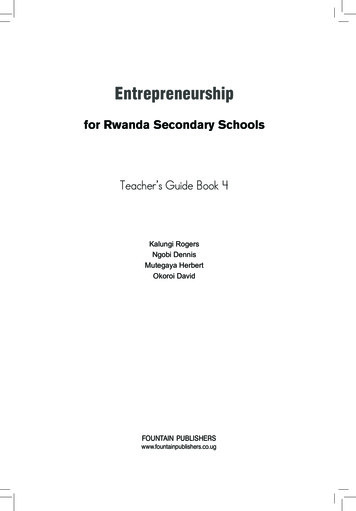
Transcription
Entrepreneurshipfor Rwanda Secondary SchoolsTeacher’s Guide Book 4Kalungi RogersNgobi DennisMutegaya HerbertOkoroi Davidfountain publisherswww.fountainpublishers.co.ug
Fountain Publishers Rwanda LtdP.O. Box 6567Kigali, lishers.co.ugWebsite: www.fountainpublishers.co.ug Fountain Publishers 2016First published 2016All rights reserved. No part of this publication may be reproduced, stored in aretrieval system, or transmitted in any form or by any means, electronic, mechanical,photocopying, recording or otherwise, without prior written permission from thepublishers.ISBN: 978-9970-19-358-5
ContentsIntroduction. vA Content Map.xxSample lesson plan.xxxviiiTopic Area: Entrepreneurial CultureSub-Topic Area:Unit 1:Entrepreneurship as a CareerInitiation to Entrepreneurship. 1Topic Area: Entrepreneurial CultureSub-Topic Area:Unit 2:Entrepreneurship as a CareerCareer Opportunities. 24Topic Area:Work ReadinessSub-Topic Area:Personal DevelopmentUnit 3:Setting Personal Goals. 36Topic Area:Business Legal AspectsSub-Topic Area:Business Laws and ContractsUnit 4:Laws in Business Operation. 46Topic Area:Business Legal AspectsSub-Topic Area:Business Laws and ContractsUnit 5:Role of Standards in Business. 84Topic Area:Business Growth and Sustainable DevelopmentSub-Topic Area:Business Market ResearchUnit 6:Market Research. 101Topic Area:Business Operations ManagementSub-Topic Area:Business Organisation and ManagementUnit 7:Business Organisation and Management. 132Topic Area:Business Operations ManagementSub-Topic Area:Financial Institutions and MarketsUnit 8:Financial management. 197iii
Topic Area:Business Operations ManagementSub-Topic Area:Financial Institutions and MarketsUnit 9:Financial Institutions. 228Topic Area:Business Operations ManagementSub-Topic Area:Accounting and Inventory ManagementUnit 10: Initiation to Accounting. 242iv
IntroductionBackground to curriculum reviewAs Rwanda moves towards Universal Secondary Educationand 12 years of basic education, it is imperative that thosegraduating from secondary schools are equipped withcompetences to ensure that they can be productive aftergraduation. Therefore, a careful review of the secondary schoolEntrepreneurship syllabus was carried out to ensure that thekey transferable skills that employers needs are provided to allsecondary school graduates. These include academic schoolskills as well as communication and team work skills.A competence based syllabus guides the development ofcompetences associated with methodologies and assessmentstrategies that specify the outcomes which are consistentwith the needs of the individual, the community and thelabour market. This syllabus offers learners the opportunity toapply what they have learnt to real life situations and makea difference in their own life with the help of their teachers,whose role is central to the success of the curriculum delivery.The Entrepreneurship competence based curriculum intendsto equip learners with a combination of skills, attitudes, andvalues as well as knowledge that a learner can demonstrateand use during and after each level of the learning process.This should enable them to accomplish employment-relatedtasks satisfactorily, while personal characteristics such asmotivation, self-confidence, and willpower are also developed.Rationale for the teaching and learning of EntrepreneurshipEntrepreneurship and societyThe developmental process and capital formation cannotin the long run be achieved by the state or by donor fundsalone. While both of these must contribute, the backbonev
Entrepreneurship for Rwanda Secondary Schools Teacher’s Guide Book 4of the process should be the middle class of the Rwandanentrepreneurs.Productive entrepreneurship must be fostered to performits traditional role of creating wealth, employment and vitalinnovations through opportunities for profit.Entrepreneurship education is a vital part of the process to builda prosperous society, and a driving force behind employment,growth and competitiveness. A successful entrepreneur is anasset to the society. He or she can contribute to the wellbeingof a society in several ways, such as the provision of goods andservices, creating new markets and new technologies, newinstitutional forms, new jobs and net increases in productivitywhich improves the living conditions of people.Entrepreneurship is a great enabler, which can help level theplaying field between developed and developing countries andregions. It is envisaged that with Entrepreneurship education,Rwanda will transform from a subsistence agriculturaleconomy into a knowledge-based society, with a vibrant classof entrepreneurs.Entrepreneurship and learnersThe subject is meant to change the attitudes of learners,encouraging them to focus more on self employment and selfreliance. It should also raise awareness amongst young peopleand the broader the community for promotion of the potentialyouth enterprises. The attitude of young people is also a driverof their productivity. Many Rwandan youths lack a culture ofentrepreneurship while some youth perceive certain types ofjobs as jobs for second class citizens. This further translatesinto a negative attitude towards learning skills related to thoseperceived as blue-collar jobs.Entrepreneurship education will help to ensure that thekey transferable soft skills that employers need are beingprovided to all secondary graduates, including academicskills, communication and teamwork skills. Entrepreneurshipeducation will also help to reduce skills gaps and shortages;improving productivity and business performance; increasingvi
Introductionopportunities to boost the skills and productivity of the sector’sworkforce, including action on equal opportunities; andimproving quality and relevance of training for employmentamong learners.Using this Teacher’s guide, learners will have; progressivelymore challenging educational activities; experiences thatwill enable them to develop the insight needed to discoverand create entrepreneurial opportunities. Education isentrepreneurship, therefore, help learners to apply businessknowledge, skills and attitudes to solve environmental,economic and social problems in their everyday lives.CompetencesThe present curriculum places emphasis on learningknowledge for its own sake.The new curriculum placesemphasis on the development of competences. A competenceis the ability to use knowledge. A competence is a combinationof knowledge with skills, attitudes and values that a learnermust demonstrate during and after each level of the learningprocess that enables the learner to accomplish a certain tasksatisfactorily. Basic competences are addressed in the statedbroad subject competences and in objectives highlighted on ayearly basis and in each of the units of learning.The generic competences are competencies which areimportant in all fields, both in school and employment. Theymust be emphasised and reflected throughout the learningprocess and are briefly described below. Teachers shouldensure that learners are regularly exposed to tasks that helpthem acquire these competences.Generic competencesCritical and problem solving skills: The acquisition of suchskills will help learners to think imaginatively, innovatively andbroadly to evaluate and find the problems encountered in theirsurroundings.Creativity and innovation: The acquisition of such skills willhelp learners to take the initiative and use their imaginationsvii
Entrepreneurship for Rwanda Secondary Schools Teacher’s Guide Book 4beyond the knowledge provided in the classroom to generatenew ideas and construct new concepts.Research: This will help learners to find answers to questionsbased on existing information and concepts and use it toexplain phenomena from gathered information.Communication in official languages: Teachers,irrespective of being language teachers will ensure the properuse of language of instruction by learners. The teachersshould communicate clearly and confidently and convey ideaseffectively through spoken and written by applying appropriatelanguage and relevant vocabulary.Cooperation, inter personal management and life skills:This will help the learner to cooperate as a team in whatevertask is assigned and to practice positive ethical moral valueswhile respecting rights, feelings and views of others. Theyshould be able to perform practical activities related toenvironmental conservation and protection and to advocate forpersonal, family and community health, hygiene and nutritionand respond creatively to a variety of challenges encounteredin life.Lifelong learning: Knowledge is always changing. Lifelonglearning means the acquisition of cognitive skills and the abilityto be creative and think for themselves will help learners toupdate knowledge and skills with minimum external support.The learners will be able to cope with the evolution of knowledgeadvances for personal fulfillment in areas that are relevant totheir improvement and development.Broad entrepreneurship competencesIn addition to generic competences, there are competencesspecific to entrepreneurship. The overall goal ofentrepreneurship education is to give learners the attitude,knowledge and skills to act in an entrepreneurial way. Theintention of this is that learners should be able to:·· Use available resources properly and responsibly to creategainful activities for the present and future generation.viii
Introduction·· Use their creative and innovative powers to come up withnew products.·· Take manageable risk ventures and create employmentopportunities.·· Make rational decisions based on one’s needs.·· Create and implement business opportunities from theenvironment.·· Create smart goals and make viable decisions in life.·· Save for future needs and manage finance in daily activities.·· Develop and implement a viable business plan.·· Apply standards in business operations.·· Pay taxes in accordance to Rwanda tax law.·· Exercise their rights and responsibilities as an employeeand employer.·· Demonstrate appropriate workplace behaviour and attitude.·· Perform accounting for a business enterprise.·· Apply ethical behaviour in business.Pedagogical ApproachThe competence – based curriculum design philosophyA competence-based entrepreneurship education generallybuilds on active and participatory teaching methods. Thechange to competence-based curriculum is about transforminglearning so that it is deep, enjoyable and habit-forming.It’s main characteristics are the practical, project-basedapproach, promoting practical experience through workshops,cooperation with different organisations and enterprises,including; learning settings outside school, and last but notleast, the hands-on approach of setting up and running learnerprojects. At the same time, each learner is an individual withhis/her own needs, pace of learning, experiences and abilities.Teaching strategies must therefore be varied, but flexiblewithin well-structured sequences of lessons.ix
Entrepreneurship for Rwanda Secondary Schools Teacher’s Guide Book 4Link to prior learning experiencesThe objective of entrepreneurial teaching is not only to introducenew content to learners, but to build on the student’s ownlearning experiences such as personal, family or communityexperiences in its delivery. Entrepreneurship is a subject thathas links with many other subjects such as Mathematics,Economics, History and Citizenship, English, Technology,Science and others; therefore, lessons should be deliveredshowing the relationship with other subjects.Teaching and learning methodsThe methodological approaches used in the textbooks arebased on active and participatory teaching and learning. Everypart of the book contains activities for the learners which are anintegral part of the learning process. The exact type of activitydepends on the topic being handled, the learners’ learning orcomprehension capacities, and the resources available for usein the learning process. The activities employed are learnercentered, where the learner is the main actor and the teacheris expected to apply a series of interactive learning processes.In order for secondary schools learners to learn thisentrepreneurship program focused on developing transferable21st century skills, the pedagogical structure of a skills labis provided in the learning activities. Skills lab is a timewhen learners are required to complete learning activitiesworking in small groups. The skills labs are a no-cost, easymethod to change teacher’s pedagogy from theory-based tocompetency-based instruction. Skills lab ensures teachersare accountable to completing all the learning activitiesand projects as outlined in the syllabus. Learners shouldalso engage in business clubs to guarantee they practiceentrepreneurship.NB:xIt is recommended that the teacher must always complete everygroup activity with learners giving feedback or sharing throughclass presentations, discussions, questions and answers tocome to an agreed content summary or conclusion of the lesson
IntroductionRole of the teacherSince the competency based curriculum is about learners’active participation in the learning process you must stick toa learner centered approach where you the teacher play therole of the coach/ facilitator in order to value learners’ needsand expectations. Your role as the teacher in using these textbooks should include among others:·· Organise learners in classroom or study areas.·· Designs the tasks to be performed and then works asfacilitator throughout the whole process of learning.·· Provide the necessary support to the challenging tasks.·· Plan and design appropriate tasks that can provokelearners to think critically, be creative and innovative andbe actively involved during the learning process.·· Organise and develop learning/teaching materials/resources.·· Design appropriate assessment to measure theachievement of set objectives.The role of the learnerA competence-based curriculum on which this text bookis based cannot be successful without the learners’ fullinvolvement in the learning process. They should be ready andwilling to work with the teacher in the delivery of this syllabus.The role of the learner, therefore, in the effective use of thetext book should include:·· Regular attendance in the classroom.·· Active participation in the group work activities.·· Seek assistance and feedback from fellow learners andteachers.·· Imitate/apply learnt material in their school or daily life.·· Respect school rules and regulations.·· Search for more information through continuous researchusing various sources like books, internet etc.xi
Entrepreneurship for Rwanda Secondary Schools Teacher’s Guide Book 4Special Education Needs (SEN) and inclusive approachThe new curriculum is based on the idea that all Rwandanshave the right to access education regardless of their differentneeds. This is the focus of Special Education Needs. Thecritical issue is that we have persons/ learners who are totallydifferent in their ways of living and learning as opposed to themajority. The difference can either be emotionally, physically,sensory and intellectually learning challenged.These learners equally have the right to benefit from educationin all our schools. You must, therefore consider each learner’sneeds during teaching and learning process whatever theirintellectual or physical abilities. Assessment strategies andconditions should also be adapted to the needs of theselearners. Detailed guidance for each category of learners withspecial education needs is provided for in this teacher’s guide.Assessment ApproachAssessment is mainly about improving learning and, throughimproving learning, improving teaching. Assessment is not justabout ‘testing’ learners to find out if they have learnt particularknowledge, but to find out if they have achieved the objectivesand learnt the competences, which include understanding,skills, attitudes and values. It is an important ongoing processin teaching and learning and it should be used continuously,meaning it should not be done only at the end after completinga particular topic.Assessment should include formative assessment whichtakes place throughout every teaching topic and every unitof the Learner’s Book. All the activities in the Learner’s Bookare types of formative assessment. Formative assessmentemphasises continuous assessment as part of the teachingand learning process. The idea of “assessment for learning”focuses on using the assessment information to improveteaching and learning as an ongoing process. This helpsteachers to monitor their learners’ progress on a continuousbasis. The teacher should constantly observe and evaluatelearners’ achievement, collecting data on areas of improvementand new skills that they acquire.xii
IntroductionIn doing this, teachers should focus on the learning objectivesand competences stated in the syllabus in order for learnersto be aware of what is being assessed, the assessmenttechniques being used, and the criteria used. Learners canthen judge for themselves whether they are achieving theobjectives and gaining the competences.Summative assessment tells you what learners have learntor can do after a whole section of teaching e.g. a ‘unit test’.These are also important, but assessment should not be doneonly by ‘tests’. Tests must include skills, values and attitudes aswell as just knowledge. We should test whether learners canread a map, interpret a photograph, have formed an opinionabout a topic or even changed their behaviour on the basis ofattitudes and values they have learnt. We should not just betesting the factual knowledge they have learnt.This means we should not just use one type of assessment –the traditional method used in the knowledge-based approachby which we give a written ‘test’ either consisting of answeringa series of short questions or writing an essay. We should usea variety of methods of assessment.Variety of assessmentsSome of the assessment techniques that can be used includethe following;Verbal assessment·· Answering questions verbally·· Making a verbal report·· Interview with an individual learner or groupWritten assessment·· Do a written activity (from text books or self prepared)·· Do an assignment·· Write a report·· Sit for a test or an examinationxiii
Entrepreneurship for Rwanda Secondary Schools Teacher’s Guide Book 4Practical assessment·· Participate in a field trip/excursion and collect information·· Do a science experiment and raw conclusions·· Demonstrate a particular task·· Draw, interpret and use a map·· Analyse a photograph·· Basic library research and collect informationGroup work AssessmentParticipate in a group task and discussionParticipate in a role play and dramaOther Assessment Techniques includes;·· Observation of what individual learners do·· Consultation with individual learners by asking themquestions·· Focused analyses of learners work such as portfolio, or acollection of work they have done, to determine how eachindividual learner is performing in their learning process.ResourcesThe learner centered approach in the Entrepreneurshipsyllabus delivery emphasises the need to use a variety ofteaching learning resources including those improvised orcollected by the teacher and the learners from the surroundingenvironment.Finally, referring to the syllabus unit shows how it links toother subjects, the assessment criteria and the recommendedmaterials or resources to be used in the teaching and learningprocess of Entrepreneurship.Finally, the unit shows how it links to other subjects, theassessment criteria and the recommended materials orresources to be used in the teaching and learning process ofEntrepreneurship.xiv
IntroductionList of materials neededThe materials that the teacher will need to aid the learningprocess include, but are not limited to the following:·· Reference books like textbooks, learners’ textbooks andteachers’ guides, Entrepreneurship journals, magazines,etc.·· Case study materials and scenarios.·· Computer and Internet connection.·· Projectors.·· Audio visual study and video materials.·· Entrepreneurship incubation facilities.·· Successful business resourceful people.·· Business simulations.·· Individual and group business projects.·· Data analysis software such as Microsoft Excel.·· Business incubators.·· Accounting software such as QuickBook, Sage, Pastel,Tally, Peachtree etc.·· Raspberry pi software.Human resource requirements for the successful teachingand learning of EntrepreneurshipA competent teacher of A-Level Entrepreneurship must haveat least the following minimum qualifications: a Bachelor’sDegree in Education with Entrepreneurship, Business Studies,Business Administration, Economics, Management, Finance,and professional certificates like ACCA and CPA or otherclosely related fields.Strategies to address Special Education NeedsAll learners have the right to access education regardless oftheir different impairments and this means that all citizensbenefit from the same choice of education programmes. Thisis meant to focus on special needs education since we havelearners who are totally different in their ways of living andlearning and the difference can either be emotional, physical,xv
Entrepreneurship for Rwanda Secondary Schools Teacher’s Guide Book 4sensory and mental. Therefore, both teachers’ and schools’role is to enrol them and also set strategies to provide relevanteducation to them.Parents and teachers should communicate on cases relatingto learners’ special education needs and difficulties so thatthey can jointly help. Parents are requested to collaborate withthe school administration and teachers towards the academicprogress and achievement of their children.Adaptation of teaching methods and approachesTeachers should have a positive attitude towards all categoriesof learners and use teaching and assessment approachesappropriate to meet each individual learners special needs; forexample learners with hearing and visual impairment dependmore on sign language and the using of concrete objectssuch as models, diagrams and samples. The examination,therefore, should be standardised to meet different categoriesof learners with special education needs and the interpretationof results and decisions should be fair.The teacher will aim to use the following strategies if he/she isto cater for learners with special needs.·· Use cooperative learning, for instance, through groupworks and discussions.·· Mix learners with special needs with other learners.·· Tape-record portions of textbooks, trade books, and otherprinted materials so learners can listen (with earphones) toan oral presentation of necessary material.·· Providing written or pictorial directions to those with hearingproblems.·· Design special programmes and follow up to keep track oftheir learning.·· Provide special needs learners with frequent progresschecks.·· Using of concrete objects such as models, diagrams,samples, and the like to those with hearing problems soxvi
Introductionas to demonstrate what you are saying by using touchableitems.·· For learners with hearing problems, visual aids, signlanguages would be appropriate.Syllabus UnitsSenior Four UnitsKey competences at the end of senior fourAt the end of Senior Four, the learner should be able to:············Exhibit the behavioural qualities of an entrepreneur.Make rational career choices in daily life.Make plans to reach their personal goals.Evaluate the need for laws in business operation.Analyse the role of standards in business.Examine key components of a market and the role ofmarket research.·· Analyse the importance of management in a businessorganisation.·· Evaluate short and long term capital for future investment.·· Evaluate the services/products offered by financialinstitutions.The roles of the teacher and learners in competence-basedassessmenta)The teacher:Teachers should be clear about what they intend toassess and how to do it.xvii
Entrepreneurship for Rwanda Secondary Schools Teacher’s Guide Book 4Plan the assessmentPrepare the learnersConduct the assessmentProvide feedbackWhen planning an assessment activity, the teachershould:·· Be clear about the purpose of the assessment;·· Understand, plan and design the process to be applied;·· Ensure that assessment always supports learning;·· Prepare learners for the assessment;·· Carry out assessment as an ongoing part of classroomlearning and teaching and periodically use specificassessments, tests or examinations as appropriate;·· Involve learners fully in assessment and help them tounderstand what is expected and how to improve;·· Develop learners’ roles in self-assessment;·· Evaluate evidence of learning to contribute to profiles andreport on learners’ achievements and progress.b)xviiiLearners:·· Actively engage in assessment for learning.·· Use clear understanding of assessment expectationsto demonstrate their knowledge and understanding,skills, attitudes and values through a wide range of
Introductionevidence including informal and formal assessmentsincluding specific assessment tasks, activities, testsand examinations.·· Use assessment feedback to shape and review theirlearning by reflection, setting learning goals and planningnext steps.·· Use self-assessment to improve performance.·· Collaborate in peer assessment.xix
xxBe able to exhibit thedesirable behaviouralqualities of anentrepreneur.Classify the varioustypes of entrepreneurs.Whole-class orientationthen groupsPapers and pens,Key ipmentrequiredJournals, internetaccess.22To be able to reach theirown personal goals.To be able to makerational career choices.Whole-class orientationthen groupsPapers and pens, school Work readiness trainingor public library access, program (trainer manualinternet access.1.1 examples of value,beliefs and desirablequalities. 1.2 skills andqualities assessment 1.3setting and achievinggoals.)Whole-class orientationthen groupsIdentify some of theirown and classmates’talents and interests.To be able to evaluatethe need for laws inbusiness operations.20Whole-class orientationthen groupsExplain the meaningand necessity ofstandards in businessTo be able to analysethe role of standards inbusiness.20Role of standards insocietyUNIT 5Papers and pen, internet Audio –visual tool e.gaccess (RDB website),laptops, television andDVD players, governReference books andgazettes, standardjournals.journals.Whole-class orientationthen groupsLearners identify theirExplain the meaning ofvalues, skill and personal law and business laws.strength and areas ofimprovement.21Learners identify thework they are interestedin.UNIT 4Setting personal goals Laws in businessoperationUNIT 321Career opportunitiesInitiation toentrepreneurshipNumber ofperiodsUNIT 2UNIT 1A Content Map
xxiActivitiesCareer opportunitiesInitiation toentrepreneurshipUNIT 4Setting personal goals Laws in businessoperationUNIT 3Role of standards insocietyUNIT 5Referring to knowledgeof entrepreneurship inO’ Level, brainstormthe meaning ofentrepreneurship,entrepreneur,intrapreneur andmanager; then insmall groups learnersdiscuss the stagesof entrepreneurshipprocessSkills Lab: Teams discuss andwrite top 5 personal,family/friends,employer valuesSkills Lab: Teams list types ofwork that are donein their community orother communities,and identify whichtypes interest thempersonally, writing intheir notebook whythey are interested inthat type of workBrainstorm and discuss Skills Lab:rules and regulations Teams researchat school and at theiron standards forhomes and highlightbusiness on: Whytheir importance in theare standardssociety and then make anecessary? How Teams match differentconnection to laws andare they enforced?values and skills toBusiness laws in theWhat does arelated career pathscountryconsumer do if theyGroups explore:Skills Lab:have a complaint?Desirable personalWhat can the Teams research aboutvalues, skills andentrepreneur do tothe different laws Teams list types ofstrengths; and thenensure complianceIn small groups,related to business inwork and identifydiscuss the commonand minimiselearners discuss theRwanda stating thewhich typesvalues, skills andcomplaints?distinctions betweenimportance of suchinterest them afterstrengths in relationan entrepreneur,laws when carrying Using audio visualbrainstorming theto the family/friends,intrapreneur andout business activitiesaid, learnerstypes of skills andentrepreneurs andmanager citing exampleswatch clips ontalents needed for Learners meet atowards employers.from their community/standardisationa range of differentlocal entrepreneurschoolprocess reflectingtypes of work and theor even a resourcehow standardsSkills Lab:main skills and talentsperson from any legalare developedthey have noticed ininstitution related to Teams discuss theinternationally,their classmatesbusinesstosharequalities ofregionally andinformation concerningentrepreneurs; variousnationally.business formationtypes of entrepreneursan
Entrepreneurship for Rwanda Secondary Schools Teacher’s Guide Book 4 of the process should be the middle class of the Rwandan entrepreneurs. Productive entrepreneurship must be fostered to perform its traditional role of creating wealth, employmen
